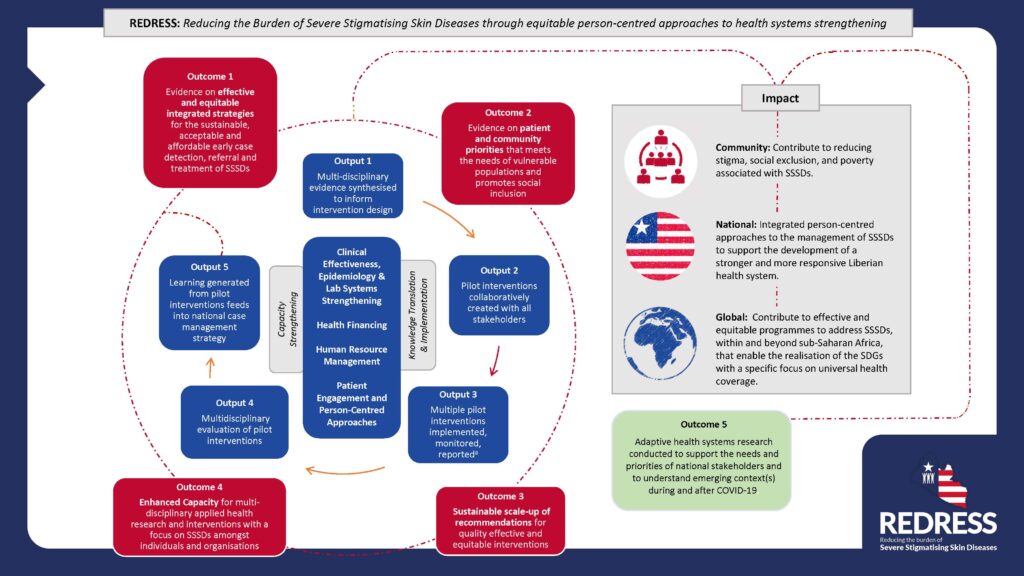The Problem
Severe stigmatising skin diseases (SSSDs) most often affect the poor, vulnerable and marginalised, especially in areas where health systems are under resourced and fragile, like Liberia. Effective systems to support those affected by SSSDs (and their families) rely on training of health care workers, active detection of cases, timely clinical diagnosis and laboratory confirmation, as well as holistic treatment including mental health support. All of these elements must come together efficiently to avoid delays in diagnosis and treatment of these highly-visible conditions which can often lead to social stigma and exclusion as well as disability and in some cases death. However, often, treatment of a person affected by an SSSD doesn’t involve all of these important elements and the social and psychological impacts of illness and how these vary by age, geography, poverty and gender are overlooked.
Our Approach
REDRESS hopes to overcome these challenges using a person-centred approach to evaluate, develop and adapt health systems interventions for the management of SSSDs in sub-Saharan Africa by:
- Identifying effective strategies to detect, refer, treat and support people living with SSSDs that are acceptable, affordable and sustainable especially amongst the most vulnerable
- Designing and testing innovative health systems interventions that are responsive to both biomedical and social support needs by assessing persons living with SSSDs, family, and provider perspectives and priorities at different levels
- Enhancing quality and equity of approaches that will see all persons living with SSSDs receiving essential, effective and affordable treatment, care and support at the individual, family, community and facility level.
Research Phases
REDRESS draws on participatory action research as our main form of collective enquiry to improve the health and wellbeing of people affected by SSSDs and reduce overarching health inequities. Participatory action research demands that power structures are challenged in the design and development of research interventions; putting persons affected by SSSDs health workers and their communities at the centre of our programme is essential to our success. REDRESS has five main research phases that reflect an overarching participatory action research cycle. You can click on each phase to understand more.
Phase One:
Formative Research
Phase Two:
Planning
Phase Three:
Action
Phase Four:
Observation & Reflection
Phase Five:
Knowledge translation & policy change
Phase One: Formative Research
During this phase we will evaluate existing integrated approaches for the early detection, referral and treatment of SSSDs from the perspective of our core themes.
Phase Two: Planning
During this phase we will work with health systems actors and people affected by stigmatising skin disease to co-create new and adapt existing interventions.
Phase Three: Action
During this phase we will implement co-created interventions through existing health systems and community infrastructure.
Phase Four: Observation & Reflection
During this phase we will conduct multi-disciplinary evaluation of intervention bundles aligned to each of our core themes to make recommendations for quality improvement and scale-up of integrated SSSD interventions in Liberia.
Phase Five: Knowledge translation & policy change
This phase will work throughout the lifetime of REDRESS along with the MoH to scale up and embed successful interventions within routine health systems management of SSSDs and to make recommendations for the integrated management of SSSDs across the West African region.
